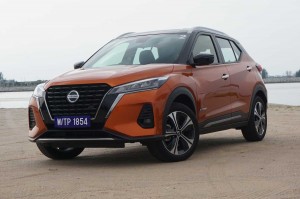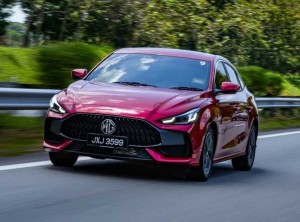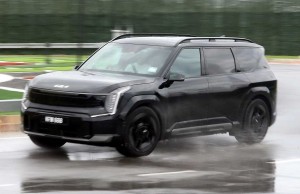Guard against China car onslaught
By THE STAR | 20 October 2024
PETALING JAYA: The global automotive industry is undergoing a seismic shift, and nowhere is this more evident than in the rise of Chinese-made cars.
Once seen as low-cost alternatives, these vehicles have rapidly evolved, benefiting from China’s aggressive government support, innovation in electric vehicles (EVs), and expansion through global trade initiatives like the Belt and Road Initiative.
Automakers like Geely, Great Wall Motors, BYD and Chery benefit from this as they expand their presence in emerging markets.
Malaysia has not been spared as these cars flood markets from Europe to South-East Asia.
Is our government doing enough to stop this onslaught and protect the future of Malaysia’s automotive sector?
Every car company, from Europe to the US, is under threat from China’s automotive giants. This is evident as three German manufacturers posted declining third-quarter sales in China.
BMW posted a 30% decline, its steepest there in more than four years and Mercedes’ deliveries declined 13% amid poor demand for its cars, including the S-Class and Maybach limousines.
Porsche’s sales in China tumbled 19% to its worst third-quarter performance in a decade as global demand for the Taycan nearly halved. Volkswagen — the parent of Porsche and Audi — reported a 15% decline.
Malaysia, too, finds itself at a crossroads.
While there has been much discussion about boosting car exports, particularly with homegrown brands like Proton and Perodua, it seems that the local market is still susceptible to the influx of foreign-made vehicles, particularly from China.
The government is expected to announce more incentives for the auto sector, particularly for EVs, a commendable move in keeping up with global trends. However, is this enough to spur local manufacturers?
The need to broaden exports is imperative. The Malaysian automotive sector has reached a plateau in terms of total industry volume (TIV). With a relatively small domestic market, at around 800,000 units annually, local manufacturers simply do not have the economies of scale to compete with global giants.
To truly fortify our position, the government should help Malaysian automakers expand abroad, which will help drive down car imports and bolster the domestic industry while reducing the trade deficit in the automotive sector.
That said, Malaysia’s automotive sector is receiving robust support from the government through policies like the National Automotive Policy (NAP) 2020, green technology incentives, international partnerships and export promotion programmes.
The NAP 2020 outlines specific strategies to enhance the global competitiveness of Malaysia’s automotive sector. It entails plans to increase vehicle exports and expand the presence of Malaysian automotive companies in foreign markets.
The government has introduced several electric vehicle (EV) incentives as part of initiatives to facilitate the energy transition process.
Among them are full import and excise duty exemption for four years from Jan 1, 2022 to Dec 31, 2025 for completely built up (CBU) EVs.
In addition, components for locally assembled EVs are exempted from an import duty for six years until Dec 31, 2027.
Locally-assembled EVs would enjoy a full exemption of excise duty and sales tax exemption also for six years in the same period.
While the push for EVs is undeniable, the government must recognise that EVs remain a niche market domestically. The lion’s share of the automotive sector still lies in traditional internal combustion engine (ICE) vehicles.
As we pursue incentives for green vehicles, equal, if not more, attention should be given to supporting the ICE segment, which is still the main contributor to TIV. This will ensure that local manufacturers remain competitive, even against lower-priced cars from China.
Importance of international expansion
Proton’s recent ventures, especially into Egypt, are encouraging signs of how Malaysian car makers can grow their footprint abroad.
Proton is already present in 20 countries, including markets in Asia, the Middle East, and Africa. But its exports comprise only about 3% of total sales of 101,489 units year-to-date.
The government, through agencies like Malaysia External Trade Development Corporation and Malaysian Investment Development Authority, has shown willingness to support these initiatives.
However, Steven Xu Yuan, director of international sales at Proton, tells StarBiz 7 that Malaysia does not provide the same level of government support for international expansion that countries like China, South Korea, and Japan do.
Financial assistance, diplomatic backing and trade agreements should be pursued more aggressively to help our local brands establish a stronger presence overseas.
China, South Korea and Japan have all adopted strategic approaches to bolster their automotive industries, particularly in terms of exports.
China’s government subsidises EV manufacturers, opens new export markets through the Belt and Road Initiative, and encourages technology transfer through joint ventures. South Korea has embraced research and development funding and trade agreements that give automakers easy access to key global markets.
Japan, meanwhile, has long supported its automakers through export-oriented policies and strong international alliances.
Malaysia must take note of these strategies if it hopes to compete on the global stage.
The automotive industry has far-reaching impacts. Car manufacturing plants are catalysts that drive job creation across interlinked industries, from component manufacturing to logistics and even retail.
By focusing on expanding the local manufacturing base and export markets, Malaysia can enhance its economies of scale, improve the trade balance and uplift local talent.
A thriving automotive sector would ripple through the entire economy, empowering job creation and fostering innovation in fields such as robotics, AI and IoT.
The onslaught of Chinese-made cars represents a challenge, but is also an opportunity for Malaysia.
The government must implement a dual strategy — focusing not just on EV incentives but also on supporting the larger ICE vehicle market.
Expanding exports, providing financial backing for international expansion and fostering innovation in the automotive supply chain will ensure that Malaysia remains competitive in a rapidly evolving global market.
The future of our automotive sector, and by extension our economy, depends on these proactive measures. If we fail to act now, we risk becoming another market overtaken by Chinese giants.
> It is imperative for the Malaysian automotive sector to broaden exports
> Financial assistance, diplomatic backing and trade agreements should be pursued more aggressively. —
DOREENN LEONG
Tags
Autos News
Reviews

Nissan Kicks e-Power: Kicking off a new efficiency

6.8
Mercedes-Benz GLB 200: Measured versatility

MG5: Slick and comfortable cruiser

8.2
Kia EV9: Prime cut

8.0
Triumph Tiger 1200 GT Pro: High adventure on two wheels

8.0
Honda Civic Type R (FL5): Ride on the wild side

Mitsubishi Xpander facelift: Expanding the reach

First drive of Geely Galaxy E5
Videos

Aveta VTM 250; Affordable & Road Legal Adventure Bike

Nissan to launch affordable Vehicle to Grid technology from ...

Aveta VTM 250 hits Malaysian roads
